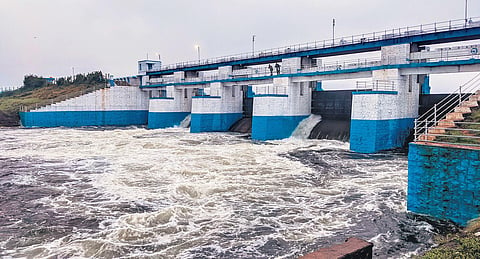

CHENNAI: The heatwave coupled with reduced supply of Krishna water from Andhra Pradesh has led to a dip in city's reservoir levels. Despite a bountiful northeast monsoon, the levels of major reservoirs are lower than last year.
According to official records, the combined water storage of the five reservoirs - Chembarambakkam, Red Hills, Poondi, Thervoy Kandigai and Cholavaram - stands at 8,824 mcft while it was 9,337 mcft at the same time last year.
The major problem is the lack of proper maintenance of the reservoirs. While Chennai's annual water requirement is 20 tmc, the total capacity of five reservoirs is only 13.21 tmc.
When water was released from Chembarambakkam in November 2020, following cyclone Nivar, the PWD officials had assured that not a drop of water was going to waste since check dams downstream would collect it.
However, with bountiful rain in 2021, they kept releasing more water but failed to maintain the check dams and tanks. The check dams filled up since more than half is covered with silt, said experts. "Those in low-lying areas are in constant fear whether their homes will be flooded due to water release from the reservoirs. Ironically, some of the very same localities did not have a drop of potable water during the 2019 drought. “We do not know about what will happen in a few months," said S Raghavan, a resident of Adyar.
The Chembarambakkam reservoir was constructed over a century ago, but proper desilting has never been done. A project was undertaken in 2019 to desilt Chembarambakkam, Red Hills, Poondi, Cholavaram at a cost of approximately Rs 36 crore. The project was also expected to bring in additional revenue with the sale of excavated sand. Chembarambakkam alone was expected to generate Rs 191 crore.
The project duration was eight years to desilt the entire lake, which has a storage capacity of 3,645 million cubic feet (mcft). As much as 151.80 lakh cubic metres of silt was to be removed and transported through 25.30 lakh lorry loads. Work orders were sanctioned but the project never really took off.
"There are more than 500 tanks in Chennai, but none of them are desilted. Even under the major desilting projects, for which funds are allocated, only lakes are taken into purview. If timely desilting is done, tanks would store more water," said K Varadhan, a water conservation activist.